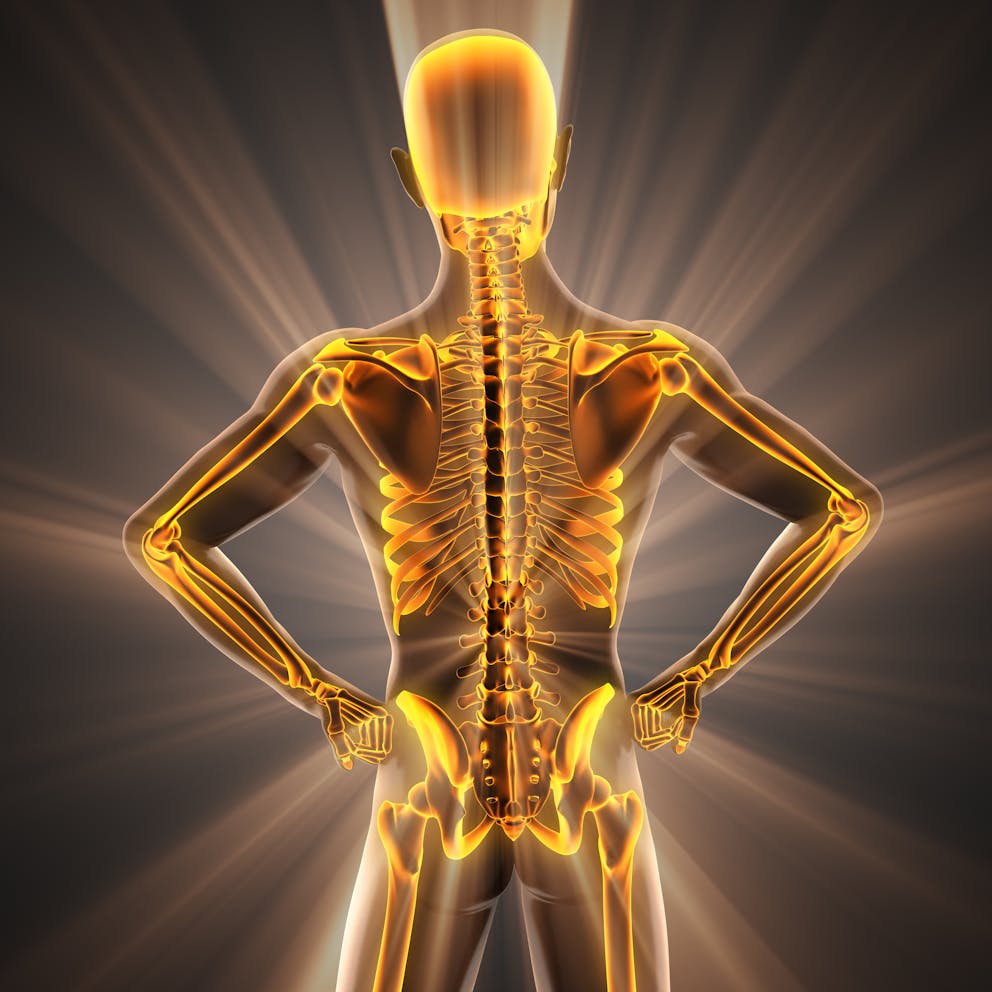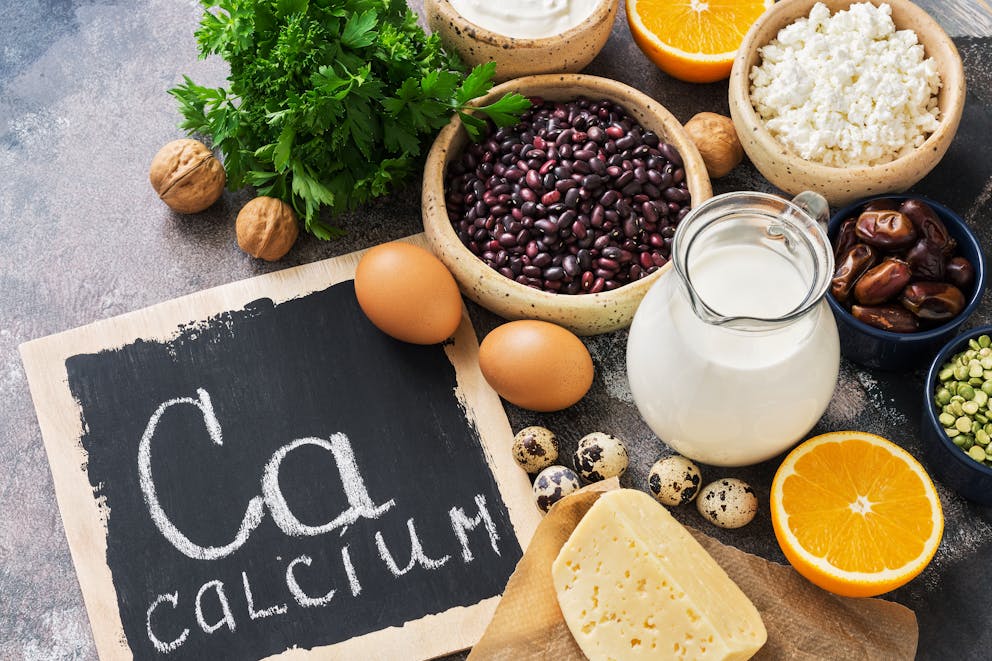Why Calcium May NOT Do Anything on Your Osteoporosis
Do you experience aches, tiredness, and a constant feeling of being drained? Are you also dealing with bone loss? This can be incredibly frustrating, but you're not alone.
Many people, especially as they get older, struggle with calcium and osteoporosis. While osteoporosis is often perceived as simply a calcium deficiency, the reality is more nuanced.
This blog post will explore the surprising factors behind osteoporosis. It will offer actionable tips you can use to protect your bones.
The Relationship Between Calcium and Osteoporosis
Osteoporosis, meaning "porous bone," weakens bones and makes them prone to fractures. Low bone mineral density is the primary culprit behind increased fracture risk.
While insufficient calcium intake contributes, other crucial factors play a role in osteoporosis development.

The Cortisol Connection: Stress and Bone Health
High cortisol levels, often caused by chronic stress or hormonal imbalances, can significantly impact bone health, irrespective of calcium intake.
Cortisol hinders bone formation and accelerates bone breakdown, potentially leading to osteoporosis if left unaddressed. Even with adequate calcium, stress interferes with bone rebuilding.
Stress reduction and balancing cortisol are paramount for maintaining and rebuilding bone tissue. Prioritizing stress management is especially important for postmenopausal women.
Here are a few ways to manage stress:
Regular exercise: Incorporate activities like walking or tai chi to relieve stress.
Sufficient sleep: Prioritize getting enough restful sleep.
Mindfulness practices: Techniques like deep breathing can calm stress and address hormone imbalances related to osteoporosis.
Hormonal Changes: How Menopause Impacts Osteoporosis
Menopause is another critical factor in the interplay of calcium and osteoporosis. During menopause, estrogen production in the ovaries decreases, causing the adrenal glands to compensate.
Weakened adrenals can lead to elevated cortisol, exacerbating calcium-related bone issues.
This hormonal shift underscores the need for stress management in postmenopausal women.
The Importance of Vitamin D and Vitamin K2
While calcium is essential, vitamins D and K2 are equally vital for strong bones. Vitamin D helps your body absorb calcium from food sources, including calcium-rich foods and fortified foods.
Vitamin K2 directs the absorbed calcium into your bones. This ensures optimal bone health by facilitating proper calcium utilization.
Without enough vitamin K2, calcium might accumulate in the arteries. This can increase the risk of cardiovascular problems.
Supplementing with vitamins D and K2, along with managing cortisol and stress, ensures calcium is effectively absorbed into bone tissue.
Beyond Calcium: Other Factors Affecting Osteoporosis
The discussion around calcium and osteoporosis often centers on supplements and nutrients. While these are important, other external factors deserve equal, if not more, attention. These other risk factors are significant contributors to the disease.
Diet, Lifestyle and Underlying Medical Conditions
Dietary choices, including consuming calcium-rich foods like leafy greens, almond milk, and yogurt, along with weight-bearing exercises, are vital for osteoporosis prevention.
Habits like alcohol consumption and smoking increase your risk of bone thinning. Certain medical conditions, like autoimmune diseases, and medications, such as long-term steroid use, can also impact how your body handles calcium.
These factors can weaken your bones over time and contribute to developing osteoporosis.
Managing these risk factors, including taking the recommended daily allowance of vitamin D through various good sources, such as fatty fish, is key to maintaining healthy calcium levels.
Supplementation Strategies
When discussing calcium and osteoporosis, proper guidance on supplements is essential for maximum benefit. People with bone mineral loss need support to efficiently absorb calcium supplements.

Calcium Citrate, Calcium Lactate, and Calcium Gluconate: Choosing the Right Form of Calcium
Not all calcium supplements are created equal. Calcium carbonate has low absorption rates, while calcium citrate and calcium lactate, chelated forms of calcium, are absorbed more efficiently.
However, calcium supplements alone may not suffice if vitamin D or K2 levels are low. It's crucial to check these levels and consider separate supplements for maximum absorption.
Combining supplements with lifestyle and dietary changes, including consuming calcium-rich foods, yields better outcomes for skeletal health.
Excessive protein intake can increase acidity levels, which can lead to reduced bone density. Maintaining a proper blood pH is essential for bone health.
Consider adding foods rich in calcium to your daily diet, such as canned salmon, fortified breakfast cereals, and certain fruit juices.
Ensure you meet the recommended daily intake based on your age and gender to avoid long-term health problems related to bone health. Pay attention to the calcium content of the food and supplement labels to keep track of your daily consumption.
Calcium and Osteoporosis: Practical Tips for Bone Health
Building strong bones requires a multifaceted approach encompassing dietary improvements and physical activity. It also necessitates managing systemic factors like hormone imbalances.
Estrogen, crucial for bone strength, starts to decline with age, impacting skeletal sustenance. This especially affects women older than 50.
Food Sources vs. Supplementation
Milk, cheese, and fortified dairy products are excellent sources of bone-supporting nutrients. Fortified foods can further supplement calcium intake, especially for those on non-dairy diets.
Calcium supplements can help bridge nutritional gaps if dietary intake is insufficient. Always follow the instructions on the supplement bottle for appropriate ingestion.
Consuming various calcium-rich foods alongside supplements helps maintain adequate calcium levels for healthy bones.
Adjusting Calcium Consumption When You Have Osteoporosis
Managing osteoporosis requires consulting a physician about calcium intake and supplementation. This includes considering how calcium interacts with any prescribed medications.
Certain minerals like vitamin K can be supplemented in smaller doses up to around 100mg/day.
Vitamin K2 and D3 supplements are helpful for calcium absorption. D3 can elevate other forms of vitamin D naturally, but addressing underlying issues like stress is crucial for treating osteoporosis, not just the symptoms.
For individuals with existing conditions such as kidney stones, it's crucial to consult a doctor about adjusting your calcium diet to prevent further complications and ensure overall health.
Women older than 50, in particular, should ensure their calcium levels are sufficient to support bone health as they enter menopause and beyond.
Harnessing Nutrient-Dense Foods for Stronger Bones
Maintaining optimal bone health requires more than just calcium supplementation; it involves a well-rounded diet rich in essential nutrients like vitamin D, magnesium, and probiotics to support calcium absorption.
One excellent dietary choice is Bulgarian yogurt, which not only provides a natural source of calcium but also contains probiotics that enhance gut health, aiding in better nutrient absorption.
Unlike heavily processed dairy products, Bulgarian yogurt offers a rich nutritional profile with a high protein content that supports bone density and muscle maintenance.
Including this yogurt in your daily diet, alongside other calcium-rich foods such as leafy greens and nuts, can help fortify bones and reduce the risk of osteoporosis over time.
Prioritizing whole, nutrient-dense foods ensures a proactive approach to long-term bone strength and overall well-being.
Conclusion
Managing calcium and osteoporosis requires a holistic approach, encompassing diet, lifestyle, and supplementation. Remember that bone building takes time and consistent effort.
Involve your healthcare provider for guidance and comply with their recommendations for optimal outcomes. While some solutions may seem simple, underlying causes may require medical attention.
Effectively addressing calcium-related osteoporosis involves managing interconnected imbalances and implementing sustained, holistic strategies.
Patience and consistent effort are key to rebuilding bone strength after osteoporosis. Don't underestimate the value of seeking professional advice and support.
Understanding how your body absorbs calcium and its overall impact on bone density becomes crucial as it plays a vital role in bone health, particularly in reducing the risks of vertebral fracture and hip fracture, common osteoporosis-related injuries.
FAQs about calcium and osteoporosis
Does taking calcium help with osteoporosis?
Calcium is crucial for bone health. However, supplements alone may not be sufficient for preventing or treating osteoporosis. Factors such as vitamin D and K2 intake, cortisol levels, and lifestyle choices play significant roles.
For severe or long-term osteoporosis, higher calcium intake and supplementation are even more critical.
Increasing calcium intake becomes increasingly crucial with older age, especially for men aged 71 and older and women older than 50, to prevent further bone loss and potential hip fractures.
What is the silent killer of osteoporosis?
High cortisol levels, typically due to chronic stress, are considered a silent threat to bone health. Cortisol interferes with calcium absorption, disrupts bone formation, and can even accelerate bone breakdown.
For good bone health, explore food sources rich in calcium and other essential nutrients, such as dairy products, green vegetables, soy beverages, and fortified foods.
What is the best supplement to increase bone density?
There isn't a single best supplement. A combination of calcium, vitamin D, and vitamin K2 is often highly effective. Vitamin D aids calcium absorption, and K2 directs it to the bones.
Many foods rich in calcium are available, making it easier to incorporate these nutrients into your daily diet.
Ensuring sufficient calcium intake, along with vitamin D through various good sources such as sun exposure and fortified foods, helps build strong bones and reduce the risk of broken bones.
This is particularly important for people with a higher risk of osteoporosis, such as those with a family history of fractures.
How much calcium and vitamin D should I take for osteoporosis?
Recommendations vary, but 1200 mg of calcium and 800 international units of vitamin D daily are common. Consulting a healthcare professional for personalized advice is always recommended.
Taking calcium without K2 can cause heart problems. It's vital to maintain a balanced approach and avoid excessive doses of single nutrients. All nutritional components work together.
Previous blog
Understanding Hormonal ImbalanceNext blog
Problems Being a VegetarianTags

Popular
08/21/2024
55K views
02/23/2025
46.3K views
11/18/2024
277.5K views
03/18/2024
11/21/2022




